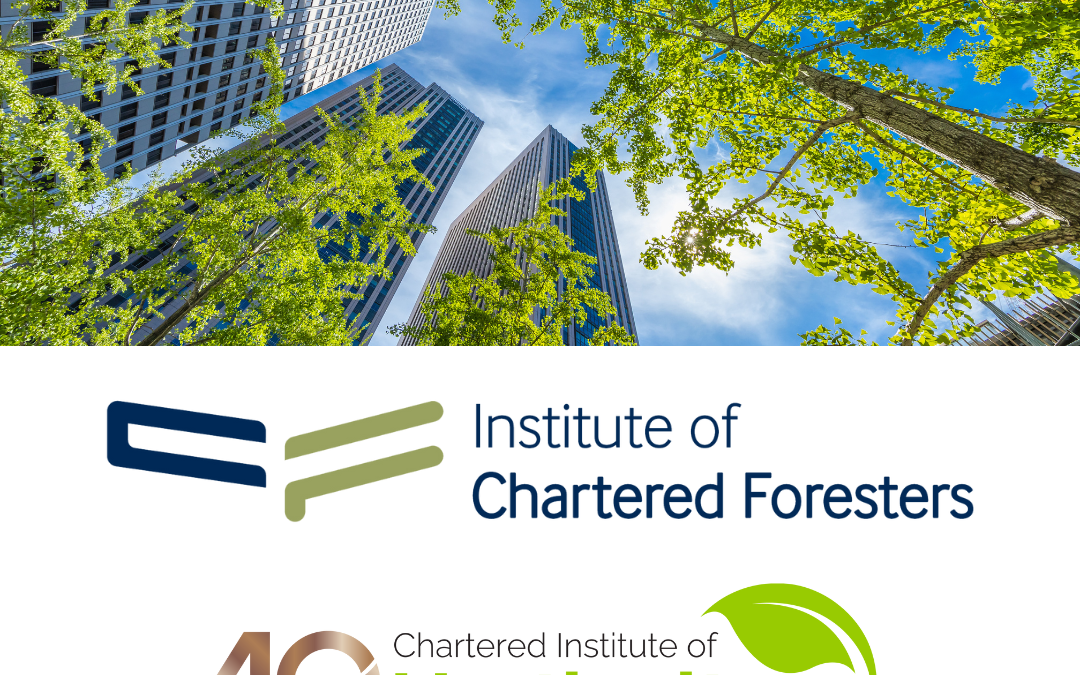Date – 4 December 2024
Time – 12:00 pm - 1:30 pm
Join us for a collaborative webinar on topics of mutual interest for members of the Institute of Chartered Foresters and Chartered Institute of Horticulture.
In this second joint webinar between the Chartered Institute of Horticulture (CIH) and the Institute of Chartered Foresters (ICF), the focus will be on how we plan for planting in urban areas. Our two complementary speakers will bring different perspectives on this topic and bring together members from both sectors.
Programme
Branching Out: Bringing Social and Cultural Values into Decision Making in Urban Treescapes – Alison Dyke
Alison will talk through the Branching Out project which is developing new ways of mapping the social and cultural value of trees to inform policy decisions regarding urban treescapes in the UK. Led by Professor Michael Wilson from Loughborough University, with partners from the Open University, University of York and Forest Research, Branching Out focuses specifically on urban treescapes.
The project was developed in response to the increased tree planting targets of local authorities, who recognize the importance of trees for carbon sequestration, and public health and well-being, as well as the neglect of social and cultural factors in decision making on urban trees.
The primary aims of the project are to establish interdisciplinary work between policymakers, public servants and citizen scientists and use this to discover the social and cultural value of treescapes. To accomplish this, it will use storytelling as a key method for capturing the social and cultural values of trees, alongside a range of other approaches to understanding urban treescapes, including urban tree observatories, hyperspectral remote sensing, historic mapping and computer vision techniques, amenity modelling and citizen science in order to develop the largest and most robust urban tree monitoring data set in Europe.
The practical realities of engaging residents, communities, town and parish councils to help them plant their open spaces and build better urban forestry programs from the ground up – Russell Horsey MICFor
With poor planting practice commonplace across the UK, should we switch from contractors and do more engaging with more residents ?
Across the USA and Canada urban forestry programs see resident inclusion as a cornerstone of any program. However residents’ engagement varies across the world in terms of its success or even its existence. In the UK, urban forestry programme engagement with residents is on the whole very poor and hollowing out of local government during the austerity years means many soft skills to engage with the public has been lost along with staff.
At the same time urban forestry professionals have often been sidelined from crucial decisions meaning in many cities residents have lost faith in their programs. The most prominent of these in recent years has been in Sheffield and also Plymouth where programs of tree removal have met with protest, local governments issuing injunctions against residents and even looking to send residents to jail for trying to protect their trees.
This presentation will look at work from a number of case studies from across the UK where residents and local groups have worked to try and plant trees in their neighbourhoods. It will look at some of the challenges they have faced, from mind boggling ‘local government processes’ to a lack of trained staff within local government, and also scepticism around the need to engage or even that if trees planted will survive if they are planted by residents.
Speakers
Alison Dyke – Research Fellow, Stockholm Environment Institute, York
 Alison is a political ecologist with over 20 years experience working on nature-society relations. She is particularly interested in relationships between people and the environment, investigating the impact that these relationships have on human and non-human health and well-being. In several projects, she has explored how these relationships are mediated by human values. She particularly focuses on the social and cultural values associated with trees, building understanding of how these values are dynamic in relation to risk (funded by Defra), what metrics might be used to measure different types of value (again funded by Defra) and how these values can be included in land managers’ decision making (funded by NERC).
Alison is a political ecologist with over 20 years experience working on nature-society relations. She is particularly interested in relationships between people and the environment, investigating the impact that these relationships have on human and non-human health and well-being. In several projects, she has explored how these relationships are mediated by human values. She particularly focuses on the social and cultural values associated with trees, building understanding of how these values are dynamic in relation to risk (funded by Defra), what metrics might be used to measure different types of value (again funded by Defra) and how these values can be included in land managers’ decision making (funded by NERC).
Russell Horsey MICFor – Director, Goetre Villa
 Russell is a Chartered Arboriculturist who specialises in new technology through the TreePlotter suite of software and working with community groups, councils and cities on urban forestry management planning and public engagement and tree planting. An internationally known speaker for his work in Local Government having presented to audiences around the UK, Canada, USA, New Zealand and Europe. Russell currently sits on the Institute’s Council and is also a Fellow with Create Streets.
Russell is a Chartered Arboriculturist who specialises in new technology through the TreePlotter suite of software and working with community groups, councils and cities on urban forestry management planning and public engagement and tree planting. An internationally known speaker for his work in Local Government having presented to audiences around the UK, Canada, USA, New Zealand and Europe. Russell currently sits on the Institute’s Council and is also a Fellow with Create Streets.
